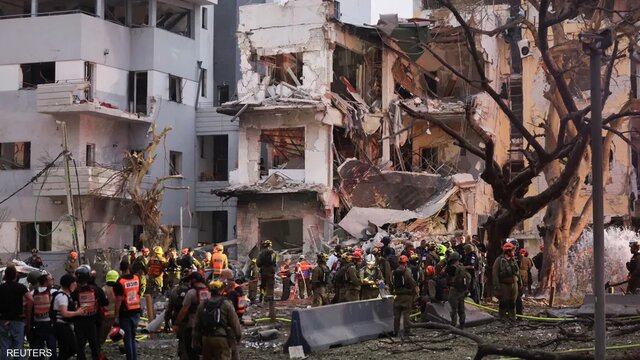Alwaght- As the full-scale Israeli-Iranian war unfolds, the two sides target each other's economic and energy centers. In the occupied territories, the Haifa and Bazan oil refineries have taken serious damage as a result of Iranian missile strikes. Raining Israeli energy centers with missiles by the Islamic Republic of Iran came after Israeli military hit part of Iranian energy facilities including South Pars Block 14 in Kangan in south of the country. In fact, it was first Tel Aviv that attacked Iranian energy and Tehran responded with similar strikes.
Tel Aviv strives to drag Washington into war
It seems that the Israeli attacks on Iranian energy facilities are openly aimed at bringing war to the Persian Gulf coasts. Since a major part of the Iranian energy facilities are on the Persian Gulf coast, the attacks on the South Pars gas field can have fallout beyond the Iranian borders and can overshadow the energy flow in the Persian Gulf and the Arab monarchies. Meanwhile, it is natural that if the Iranian energy is challenged in the Persian Gulf and the country faces difficulties doing its activities in its energy regions, Tehran will not allow other countries to export energy from the Strait of Hormuz.
Should such a scenario take place, the US will likely intervene to take control of energy exports in the Persian Gulf. In other words, the Israeli transfer of crisis to the Persian Gulf is meant to embroil the US in the war against Iran and actually the Israelis are striving after this aim.
Why US intervention?
It seems that continuation of the war on Iran for the sixth day has not given Israelis their aims and the obvious increase in the number of Israeli casualties and infrastructure damage are pressing Tel Aviv leaders to shorten the war. Meanwhile, one of the aims of the Tel Aviv's aggression on Iran is eliminating Iranian nuclear facilities and missile power, an aim it has failed to meet.
Both major Iranian nuclear sites of Fordu and Natanz are actually built deep underground and according to reports, Fordu as the most important uranium enrichment site is located hundreds of meters under the mountains. This shields these sites against Israeli warplanes.
On the opposite side, the waves of strong Iranian missile and drone strikes have already inflicted considerable damage on Israel. Latest reports suggest that the following Israeli facilities and sites have been severely damaged by Iranian strikes.
Industrial and financial centers
- Tel Aviv Financial Center as a vital region for Israeli economic and financial markets
- Industrial and port facilities of Haifa as the most important Israeli economic centers
- Haifa refinery as Israel's key energy provider
- Rishon LeZion, an industrial and residential region near Tel Aviv
- Kiryat Gate industrial park, Israel's technology and semiconductors industry hub
Military sites
- Kirya site as one of important military and executive centers equal to the US's Pentagon
- Tel Nof as one of important Israeli air bases
- Nevatim, Israel's most important air base near Dimona town
-Evda air base as the command center of electronic warfare of fixed and mobile air defense and radar bases
- Galilee military base as the army's headquarters in the north
- Rafale company in Haifa as the center of Israeli military industries
- 8200 Unit as Israeli army's cyber, wiretapping, and spying center
Security and strategic centers
- Weizemann center for nuclear and military research has taken serious damage in recent Iranian strikes.
- AMAN center as the army’s intelligence center
- Mossad headquarters
- Secret sites for the army's central command of intelligence and 8200 Unit headquarters in Herzelia
- House of Prime Minister Benjamin Netanyahu in Qisarya
Service and urban centers
- Channel 14 and Channel 16 headquarters
- Ben-Gurion airport, as Israel's most important international airport
- Haifa power plant
- Hadra power plant, the biggest located in northern Tel Aviv
Itzhak Brik, a retired Israeli army general, has warned that Israel faces risk of economic, air, trade, and military crippling should Iran realize its war plans. Pointing to the previous experiences of the Israeli military, he said that "in all past wars, Israel started powerfully, but at the end, it was pushed to agreement or ceasefire. This repetitive cycle still continues." He warned that war with Iran can be the most dangerous war because of Tehran's missile arsenal and nuclear capabilities. He further warned that it takes Israel up to $7 million to intercept each Iranian missile. He added that Israeli defense reserves are limited for such missile barrages and cannot sustain for a long time.
Netanyahu's challenges to persuade Trump
Given the scale of Israeli damage and casualties over the past six days of aggression on Iran, it is natural that Tel Aviv will do its best to get the US involved in the war on Iran, although the Israelis face major challenges in the Congress and even among Trump's supporters in their push. The Democrats of the Congress are working to block the US entry to war and the MAGA (Make America Great Again) movement as the main political backer of Trump among the Republicans and neoconservatives is opposed to Trump involving the US into an another uncertain West Asia war. MAGA is a neoconservative and isolationist movement that aims to push the US away from unnecessary international costs and Trump's involvement runs counter to his anti-war campaign-time rhetoric. So, Israel has a hard job convincing Trump to step into war against Iran and on the other hand, without the US, the Israeli regime has di far failed to realize its main war aims.



























